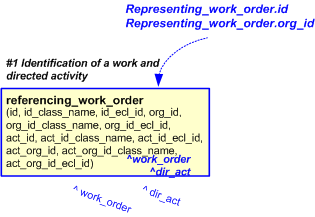Template:— ref_work_order (ref_wo)
Context:— MoDAvDEX |
Date: 2008/01/17 09:00:27
Revision: 1.1
|
This section specifies the template ref_work_order.
NOTE
The template has been defined in the context of
MoDAvDEX.
Refer to the business context for details of related templates.
NOTE
An explanation of a template and the associated instantiation path is
provided in the
Template overview
section.
This template describes how to represent a reference to a work order.
The EXPRESS-G diagram in
Figure
1
shows the templates and EXPRESS entities that are required
to represent the template
"ref_work_order".
The text highlighted in blue shows the template parameters.
Figure 1 — An EXPRESS-G representation of the Information model for ref_work_order
The graphic for the template to be used in other EXPRESS-G diagrams
is shown in Figure
2
below.
Figure 2 — The graphical representation of the ref_work_order template
The following input parameters are defined for this template:
The following reference parameters are defined for this template:
Allow the
Work_order
entity instantiated in this path to be referenced when this template is used.
Note: The
Work_order
entity can be referenced in a template path by:
%^target = $ref_work_order.work_order%
where
target
is the parameter to which the
Work_order
is bound.
Allow the
Directed_activity
entity instantiated in this path to be referenced when this template is used.
%^target = $ref_work_order.dir_act%
The following parameter combinations specify a uniqueness constraint:
Unique constraint: Unique work order
Each instance of the
entity
(
Work_order)
within the data set shall be uniquely identified
by the following parameters on this
template (ref_work_order) namely:
wo_id.
The
instance is
referenced by the following template parameter:
work_order.
The instantiation path shown below specifies the entities that are to be
instantiated by the template.
A description of templates and the syntax for the instantiation path is
provided in the
Templates Help/Information section.
/
referencing_work_order(
id=@wo_id,
id_class_name='Work_order_identification_code',
id_ecl_id='urn:plcs:rdl:std',
org_id='LITS',
org_id_class_name='Organization_name',
org_id_ecl_id='urn:plcs:rdl:std',
act_id=@wo_id,
act_id_class_name='Activity_identification_code',
act_id_ecl_id='urn:plcs:rdl:std',
act_org_id='LITS',
act_org_id_class_name='Organization_name',
act_org_id_ecl_id='urn:plcs:rdl:std')/
-- Bind the Work_order to the parameter ^work_order. -- The parameter is a reference parameter so the Work_order -- entity can be referred to when this template is used. %^work_order = $referencing_work_order.work_order%
-- Bind the Directed_activity to the parameter ^dir_act. -- The parameter is a reference parameter so the Directed_activity -- entity can be referred to when this template is used. %^dir_act = $referencing_work_order.dir_act%
Characterizations
No common characterizations of the template
ref_work_order
have been identified. However, the ISO 10303-239 EXPRESS model
may enable other assignments to the entities instantiated by the template.


